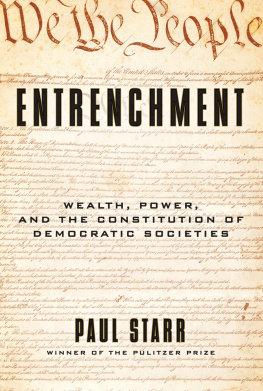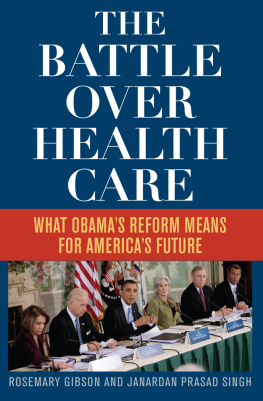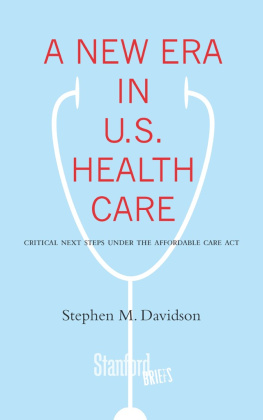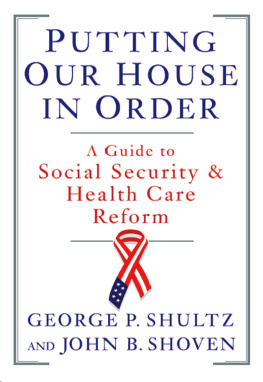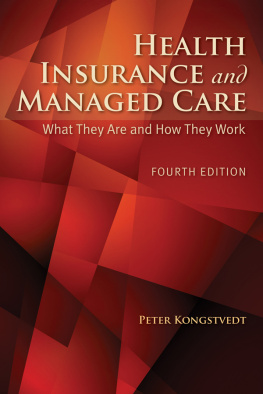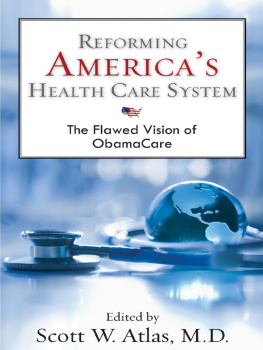CHAPTER 1
Evolution through Defeat
FOR AMERICAN LIBERALS IN THE TWENTIETH CENTURY, health insurance for all was a persistent dream and a perennial disappointment, often on the horizon but always seemingly just beyond reach. After the death of one veteran advocate, Congressman Claude Pepper, in 1989, Democrats ruefully told one another that when Pepper arrived in heaven, he asked, Will America ever have national health insurance? and the Lord said, Yes, but not in my lifetime. Before World War I, the reformers of the Progressive era had won the enactment of food and drug regulation, antitrust law, labor legislation, national parks, the Federal Reserve, and workers compensationbut met defeat on health insurance. During the 1930s and 40s, the New Deal and its successor, the Fair Deal, definitively established federal responsibility for the overall stability and growth of the economy and led to the passage of Social Security, collective bargaining laws, financial regulation, a minimum wage, and the GI Billbut not health insurance. The era of liberal reform in the 1960s and 70s added civil rights legislation, antipoverty programs, regulation of occupational safety and consumer products, environmental protection, Medicare for the elderly, and Medicaid for some of the poorbut not universal health insurance.
If Americans came to know one thing about the history of battles over health insurance, it was that a government program to make health care a right of citizenship had always been defeated. The specter of failure loomed so heavily over the national memory in health policy that public figures and the news media even attributed defeats to presidents who had never attempted to pass universal health care.
Yet this is not the story of an unchanging movement with an unchanging result. Health-care reform in the United States has been an evolving political project. While there have been historical continuities from one era to another, the objectives of reform have shifted as American politics and the economics of health care have changed. As a result, the enterprise of reform has undergone a complete transformation.
Health insurance first emerged as a public issue during the Progressive era, particularly during the years between 1915 and 1919, when reformers proposed health insurance as a program at the state level, primarily intending to provide income support for industrial workers during spells of illness. During a second period, beginning in 1935, reformers sought an expansionary health insurance program with national scope to finance medical care for the entire population. The pursuit of national health insurance continued until 1950, when liberal policy experts decided to downsize their aims to a hospital insurance program for the elderly, later to be known as Medicare. Along with favored tax status for employment-based insurance (definitively established in 1954), the enactment of an expanded version of Medicare in 1965 provided significant protection against the financial risks of illness to a majority of the public and channeled an increasing flow of the nations income into health care. As a result, when efforts to pass national health insurance resumed in the late 1960s, the political environment of the movement had changed. Proposals for universal coverage had to deal with the skyrocketing costs of both public and private insurance. Instead of proposing an explicitly expansionary program, reformers increasingly sought changes in both the organization and the finance of health care to contain costs as well as to extend coverage and improve services. Gradually, the definition of the aim changed from national health insurance to comprehensive health-care reform.
The substance and context of reform have changed so drastically over the past century that no single cause can possibly account for the outcome. From one phase to the next, the dominant paradigms for policy have changed. So have the political alliances in favor of and against reform. Neither political parties nor key interest groups have held to the same positions.
Progressive Health Insurance, 19151919
The earliest proposals for government-sponsored health insurance in the United States took their cue from programs enacted earlier in Europe. Before their governments intervened, many European workers were insured through sickness funds established by mutual societies, unions, and employers, which provided cash benefits to make up for lost wages as well as payment of doctors services. When governments first began subsidizing voluntary funds or made participation in sickness insurance compulsory, they did so as part of a series of measures to limit the threat of impoverishment from four major types of risks: workplace accidents, sickness and disability, old age, and unemployment. Germany led the way, enacting sickness insurance in 1883, and Britain adopted national insurance in 1911. The early focus of social insurance on workersthe programs typically applied first to industrial workers and only later to their dependents and othersreflected a mixture of economic and political objectives. By relieving economic insecurity among wage earners, political leaders such as Germanys Iron Chancellor, Otto von Bismarck, and Britains Liberal leader, David Lloyd George, were trying to deny socialist parties their appeal and to integrate the working class into the existing political order. Sickness insurance was also expected to increase the wealth and power of a nation through the improved health and efficiency of its labor force and army.
As government health insurance programs continued to spread in Europe, the idea at first drew little interest in the United States, though many states did adopt workers compensation programs (industrial accident insurance). The Socialist Party in the United States, far weaker than its European counterparts, endorsed compulsory health insurance in 1904, but it had little impact. Although economic regulation was gaining ground by then, laissez-faire ideas still permeated public policy, especially judicial thought. In that eras classic test of economic regulation, Lochner v. New York (1905), the Supreme Court struck down a statutory limit on the working day on the grounds that the law interfered with freedom of contract. The federal government still had only a peripheral role in public health and no role in financing medical services, except for merchant seamen. State and local governments were increasingly involved in public health measures but generally kept out of the provision and financing of medical services, except through public hospitals and clinics for the poor. Even in the private sector, protection against the costs of illness was limited. Commercial health insurance had hardly developed, and although many fraternal lodges, some unions, and a few employers provided sick pay and medical benefits, these ways of spreading the costs of illness were less common in the United States than they had been in Britain and Germany prior to government intervention.
The first significant reference to health insurance in American politics came in 1912the year after Britain passed its National Insurance Actwhen Progressive Republicans bolted from the GOP to form the Progressive Party, nominated Theodore Roosevelt for president, and had a line in their platform supporting social insurance, including protection against the costs of sickness. After succeeding William McKinley, Roosevelt had served as president from 1901 to 1909. The notion that health insurance is something that Washington has been talking about since Teddy Roosevelt was president (as President Obama put it in 2010 in one of many references) is a misunderstanding.toward the idea, and if that faction had been stronger, it might have been able, together with Democrats, to enact health insurance at the state level. Such an alliance did come very close to success in one state.


